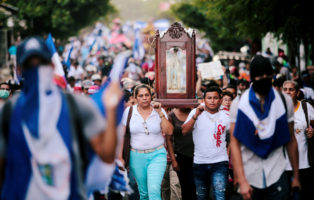By Inés San Martín

ROME (Crux) – There’s no rest for the Catholic hierarchy in Nicaragua. Months after a civil uprising that left hundreds dead, the bishops continue to raise their voices in defense of those who died, while urging the government to have an honest dialogue with those who want to oust President Daniel Ortega.
If such a dialogue resumes, Cardinal Leopoldo Brenes, archbishop of Managua, has said the Catholic Church will be available to assist.
“As you know, Pope Francis has always insisted on dialogue, because this is a part of the life of the Church,” Cardinal Brenes told a group of journalists on Sunday.
“We’re available and we continue working to promote dialogue all the time, doing so in simple ways, in our parishes, when there’s tension in a marriage or a group … if we’re called, we’ll be there.”
Speaking about where the country goes now in terms of reconciliation, the cardinal said the only way to achieve it is by starting with healing hearts. “Bad words, bad thoughts, come from the heart,” he said. “Every reconciliation project has to start with healing wounded hearts.”
To date, the total number of people killed in the protests remains unknown, but when Crux was in Nicaragua last November, various NGOs spoke of a minimum of 350 casualties, in most cases university students but also children and elderly. In addition, some 500 to 800 people are today either in prison without rights to a trial, and a similar number of people were “disappeared” between September and November.
The government of President Daniel Ortega recognizes 199 deaths and 340 prisoners, whom he describes as “terrorists,” “coup organizers” and “criminals.”
Ahead of a meeting between the bishops of Central America and Pope Francis during World Youth Day (WYD) Panama, Cardinal Brenes also said that the Nicaraguan bishops don’t expect to be able to focus particularly on their crisis.“It’s not an exclusive meeting between us [bishops of Nicaragua] and the pope,” he noted. “It’s every bishop of the Central American region who will be meeting with him. We don’t have a personal audience, we’re simply going to listen to the message he brings to us.”
All 10 Nicaraguan bishops will be attending WYD, joining a group of some 60 Central American bishops who were to meet with the pope on Thursday.
Bishop Rolando Álvarez of Matagalpa and the country’s youngest and newest bishop, had comments similar to those made by Cardinal Brenes, but indirectly requested a meeting: “The pope is very creative and we don’t know if he’s going to take the initiative to meet with us, because in the end, he always makes his own agenda.”
The crisis has had a significant impact on Nicaragua’s participation in WYD. The country was supposed to host thousands of pilgrims on the days previous to WYD, for a missionary week known as “Days in the Diocese,” but the bishops had to cancel as they couldn’t guarantee the safety of the foreign pilgrims, who instead went to El Salvador and Costa Rica.
From the Nicaraguan Diocese of Granada alone some 10,000 pilgrims were supposed to attend WYD, but the number had dropped to 1,000 by November.
In the city of Juigalpa, some 300 young people were planning on attending, but now only 70 will do so thanks to a grant from Aid to the Church in Need, a pontifical foundation headquartered in Germany that helps the persecuted Church.
Even though an estimated 70 percent of Nicaragua’s six million people are Catholics, many pro-Ortega forces in the country nevertheless believe that being Catholic and young is virtually synonymous with being a criminal, or, at the very least, a potential enemy of the state.
Throughout the crisis, which erupted in April after the government tried to implement a social security reform, the Catholic hierarchy has been at the forefront of the response, not only by mediating in the failed dialogue efforts but by literally becoming what Pope Francis describes as a “field hospital,” opening the doors of churches for the wounded to receive medical care after public hospitals were ordered not to treat protesters.
Though some Catholics aligned with Ortega find the bishops’ attitude to be biased and have walked out of Masses, according to Cardinal Brenes, it’s “fortifying to hear children, young people, the elderly, telling us that they’re always praying for us.”
Asked about a group of European parliament members supposed to go to Nicaragua this week but who are being blocked by Ortega, he said it’s always important to “listen to the positive and negative things they can give us” after observing the situation.
“It’s sad that parliaments which give great support to actions, jobs, national projects, could really cut their support,” said the cardinal.
